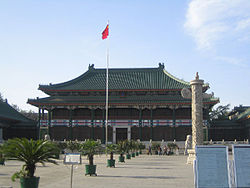National Library of China
 |
|
| Established | 1909 |
|---|---|
| Location | Beijing, China |
| Collection | |
| Size | 31,195,121 volumes (Dec 2012) |
| Access and use | |
| Circulation | library does not publicly circulate |
| Population served | members of the public |
| Other information | |
| Director | |
| Website | www |
The National Library of China (simplified Chinese: 中国国家图书馆; traditional Chinese: 中國國家圖書館; pinyin: Zhōngguó Guójiā Túshūguǎn) or NLC in Beijing is the national library of the People's Republic of China. With a collection of over 33,78 million items, it is the largest library in Asia and one of the largest in the world. It holds the largest collections of Chinese literature and historical documents in the world.
The forerunner of the National Library of China, the Imperial Library of Peking (京师图书馆; Jīngshī Túshūguǎn), was founded on 9 September 1909 by the government of the Qing dynasty. It was first formally opened after the Xinhai Revolution, in 1912. In 1916, the library received depository library status. In July 1928, its name was changed to National Peiping Library and was later changed to the National Library.
The earliest Chinese references to Western-style public libraries were by Lin Zexu in the Sizhou Zhi (四洲志; 1839) and Wei Yuan in the Illustrated Treatise on the Maritime Kingdoms (first ed., 1843), both of which were translations from Western books.
In the late nineteenth century, in response to several military defeats against western powers, the government of the Qing dynasty (1644–1912) sent several missions abroad to study western culture and institutions. Several members of the first Chinese diplomatic mission, which traveled to the United States, England, France, and other countries from 1868 to 1870, recorded their views of western libraries, noting that they attracted a large number of readers. Journalist Liang Qichao (1873–1929), who became a prominent exiled intellectual after the failure of the Hundred Days' Reform in 1898, wrote about the Boston Public Library and the University of Chicago Library, praising their openness to the public and the virtue of readers who did not steal the books that had been lent to them.Dai Hongci (), a member of another Qing mission sent abroad to study modern constitutions, noted the efficacy of book borrowing at the Library of Congress.
...
Wikipedia
